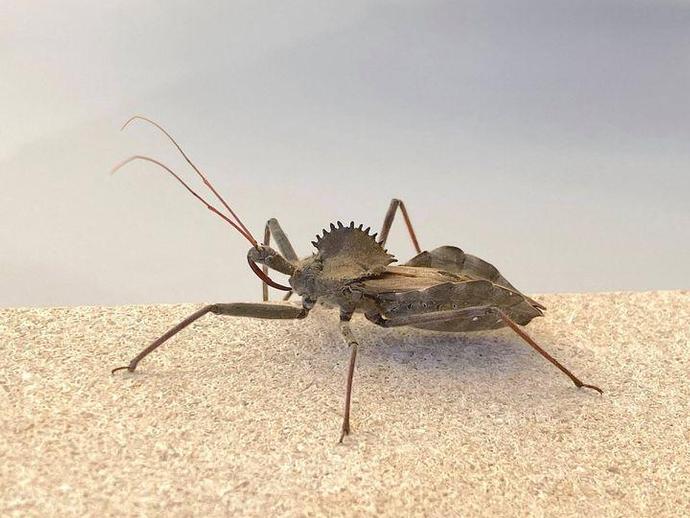November 15, 2021
Ben here with the Monday edition of #BenInNature presented by our friends at Carter Bank & Trust!
Every autumn, I can expect to get a couple of emails from folks who have found wheel bugs (Arilus cristatus) in their gardens, and they always ask the same basic question: What on Earth is this weird thing?!? With its large size and spiky mohawk, the wheel bug is one of the most unusual and eye-catching insects we have in Virginia!
Wheel bugs are a large species of assassin bug (family Reduviidae), and they're among the apex predators of the insect world. Measuring up to 1.5 inches long, they're one of the largest terrestrial true bugs in North America! If you keep a garden, you should celebrate finding wheel bugs near your home; these guys love to prey on pest insects such as Japanese beetles and tent caterpillars, and they're quite skilled at it!
Wheel bugs feed on prey by gripping it with their front legs and then stabbing it with their powerful proboscis, which is the reddish-colored structure that's folded underneath the head. They inject their prey with enzymes that paralyze and dissolve the prey item, then they suck up the delicious juices.
While wheel bugs generally don't react to humans, they WILL use that powerful beak in defense if handled roughly, and it's not an experience I would recommend. The bite is supposed to be more painful than a wasp sting, and those bitten can experience pain and numbness at the location of the bite for multiple days.
While wheel bugs are around in the spring and summer, their juvenile forms look a bit different from the fully-grown adult form. The juveniles have red abdomens and they don't have the characteristic wheel-shaped armor. The fully-grown adults don't appear until early fall, at which point their goal is to mate and lay eggs. This large female wheel bug is probably looking for a good place to deposit her eggs. Those eggs will hatch in the spring, and then the cycle will continue once more!
ABOUT #BenInNature
Social distancing can be difficult, but it presents a great opportunity to become reacquainted with nature. In this series of posts, Administrator of Science Ben Williams ventures outdoors to record a snapshot of the unique sights that can be found in the natural world. New updates are posted Monday - Friday, with previous posts highlighted on the weekends. This series of posts is made possible thanks to the support of VMNH Corporate Partner Carter Bank & Trust (www.cbtcares.com).
NATURE PHOTO IDENTIFICATIONS
If you discover something in nature that you would like help identifying, be sure to message us right here on Facebook with a picture (please include location and date of picture) and we'll have our experts help you identify it!

 Hours & Admissions
Hours & Admissions Directions
Directions

